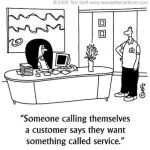 I’ve heard two really ghastly stories in the last week about poor (make that practically non-existent) customer service. They were both in the health care arena – both from hospitals (two different hospitals). They involve stories about inattentive, uncaring nurses; inattention to patient needs; obliviousness to the pain and discomfort of patients.
I’ve heard two really ghastly stories in the last week about poor (make that practically non-existent) customer service. They were both in the health care arena – both from hospitals (two different hospitals). They involve stories about inattentive, uncaring nurses; inattention to patient needs; obliviousness to the pain and discomfort of patients.
We all know such stories. They are bad enough when they are from retail outlets, or restaurants. They are absolutely unacceptable in the hospital arena. Not only does such poor customer (patient) service mean unnecessary pain, but such incompetence and/or inattention could result in health-threatening, and even life-threatening outcomes.
Not good! Not good at all!
And so, knowing the frustration of such talent shortages, companies seek the best talent.
Consider this brief excerpt from Uncontainable by Kip Tindell, CEO of The Container Store:
Principle #1: 1 Great Person = 3 Good People…
…if you were on a golf team, wouldn’t you want to have Jordan Spieth (a fellow Jesuit alum) on your team? (by the way, he wrote this book before Spieth’s incredible 2015 year).
Talent is the whole ball game. Our employees might not even have had any experience in retail. We’ve hired lawyers, PhDs, artists—people with talent and a passion for teaming up with other highly motivated employees to get the job done using their own creative genius.
So, I was talking about talent disappointment (i.e., poor customer service) with a friend, and we acknowledged what so many know to be true: that there is in fact a genuine problem. There are simply not all that many Jordan Spieths in the world.
How can you hire no one except the great superstars when there really aren’t that many superstars to go around?
I thought about Amazon’s “customer obsession.” (Note: yes, I am aware of the current wave of articles about Amazon being a very difficult place to work. But, let’s note their focus on “customer obsession”).
As I think about the “customer obsession” at Amazon, I realize that they have created a work-world with a great advantage. Practically all of their superior customer service has little to do with human interactions. When you hire for retail, or health care, you have to hire for an amazing, and rare, combination of attentiveness, competence, and something akin to “niceness.”
As the owner of a wonderful bed and breakfast put it, “you can train on technology, but you can’t train ‘friendly.’”
So, back to Amazon: their customer obsession is almost entirely produced through breakthrough technological improvements. Fast; convenient; easy to order. But, they pull this off with practically no human interaction. In other words, for the most part, they can skip the “friendly” part of the normal formula.
That opens up the pool of workers substantially.
Not everyone has such a solution – to remove one of the talent ingredients needed.
So, here’s the issue: how do you find the best, the very best, superstars, when there really isn’t an endless supply of such superstars?
I don’t know the answer to that question.
But until that challenge is solved, most of us, in restaurant after restaurant, and in hospital room after hospital room, will face more then a little disappointment.

This post is really good! I can’t believe I will be out of town for the meeting.
See you both tomorrow,
Bill
[…] https://ffbsccn.wordpress.com/2015/08/18/some-thoughts-on-talent-shortages-and-customer-service/ […]
Reblogged this on Gr8fullsoul.